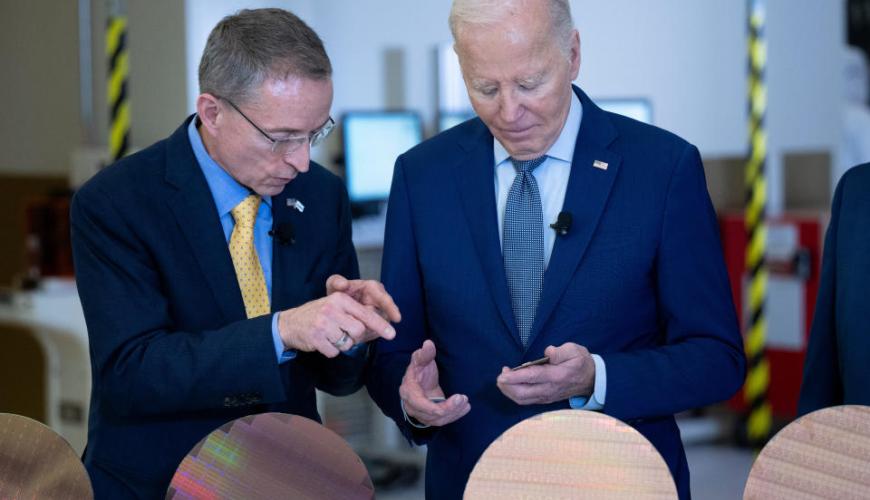The wrangling over a second wave of DC chipmaking money is already underway

A vigorous debate has already begun about whether the US semiconductor sector will need a second wave of support from Washington in the years ahead—as well as what it might look like.
Intel (INTC) CEO Pat Gelsinger, one big beneficiary of the 2022 CHIPS and Science Act, weighed in on the topic earlier this month as he announced his company's $8.5 billion government grant for a range of new chip projects.
"I don't think CHIPS 1 is the end of what we need to do to rebuild the industry," he said.
He is far from the only one. Commentary is piling up among business officials, Biden cabinet members, think tank roundtables, and on Capitol Hill as the different players signal their interest as well as the elements they might like to see in a potential second round.
Senator Mark Kelly is an Arizona Democrat who helped negotiate the first bill. He first wants to help chipmakers cut red tape as they build new projects. Then he is open to more after that.
He recently told Yahoo Finance "we need to do things that will make our supply chain stronger, so we're going to assess how this is going and we will figure out what else is needed."
The chatter comes as the current law is just getting underway. But it's a conversation some say needs to happen soon, with most muscular provisions due to expire in a few short years and Washington not known for moving quickly.
"My view is that if they wait 3 to 5 years before they start talking about it, it's going to be way too late," says Caitlin Legacki. She is a former senior advisor to Commerce Secretary Gina Raimondo and notes that the demand for grants has already far outstripped the $50 billion available.
More than 18 months transpired between when the bill that became the CHIPs and Science Act was first introduced and when President Biden signed it into law. And it was another another year and a half with the law on the books before grants began rolling out in earnest.
"In government time, that's like yesterday," Secretary Raimondo joked recently.
In addition to Intel, three smaller manufacturing awards have been announced for BAE Systems (BAESY), Microchip Technology, and GlobalFoundries (GFS).
Giants like Taiwan Semiconductor Manufacturing Company (TSMC) and Micron (MU) are still waiting but are expected to formalize their government awards in the weeks ahead.
The debate over what a second round could look like
The current law covers a range of areas, with $39 billion earmarked for grants to manufacturers and $11 billion set aside for research and development.
There are also significant new tax credits around capital improvements that could add billions more to company bottom lines. Other provisions include funds for workforce training efforts, scientific research, and more.
Count Secretary Raimondo as likely to be on board with a second round of support. At a recent Intel foundry event, Gelsinger pushed her on the question. "I suspect there will have to be — whether you call it CHIPs 2 or something else — continued investment," she responded.
The case from Raimondo and others is that the US let its semiconductor manufacturing sector languish for decades and it will take more than a few years of government support to fully restart those efforts.
Any follow-up bill — which not expected to be formally negotiated until 2025 at the earliest — is also unlikely to be a straightforward renewal.
Another round of support for the chips sector is also likely be separate from a parallel effort underway on Capitol Hill to pass a "China Competition Bill 2.0" bill focused on standing up to China more generally.
In his recent comments, Gelsinger suggested an interest in extending the law's tax credits saying of a follow-up bill "I would hope that maybe it shifts too, with long term financial structures on sustainable investments and capital investments, the right long-term tax policies and the rebuilding of the ecosystem."
And he has returned to the topic often, telling Yahoo Finance later in the week that "it's going to have some characteristics like CHIPS 1, but it needs to focus more on supply chain."
That supply chain focus is being echoed by others. Chipmaking is set to remain a global process even if the Biden administration achieves its ambitious immediate-term goal of having the US make 20% of the world's most advanced chips by the end of the decade.
Senator Todd Young, an Indiana Republican, was a co-author of the 2022 law. Alongside Sens. Kelly and others, he is also pushing efforts to make it easier to navigate bureaucracy in new projects.
At a recent Washington Post Live event, he also nodded to the potential need for another round of direct support but also pointed out some of the political headwinds it could face.
"If we want to take more risk out of the supply chain, we could invest more money in this Chips project," he said, but quickly noted he wasn't yet fully convinced and reminded the audience that "it took a lot of work" to get Republicans on board last time.
Legacki, who left the administration to co-found a consulting firm called Four Corners Public Affairs, notes that "when you look at a 2.0 version, it's going to have to be more targeted and more specific."
In a second round, she adds, policymakers could have a much clearer sense of "exactly where there are holes and this is exactly how much money we're gonna need to fill them."
Ben Werschkul is Washington correspondent for Yahoo Finance.
